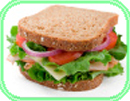|
Wellness - How can I diet when I love to eat
The truth is you don't have to stop loving food in order to manage your weight. You just need to alter the ways you view it. Start by making a list of the foods you generally find irresistible. Evaluate the damage level from each of these foods in relation to your weight-loss goals. Then, instead of assuming you have to stop enjoying all of your favorites, consider how you can budget them into your life. Smaller
amounts, less often: Use this same approach with your favorite wines, chocolate-chip cookies or fried clams. Once you budget a special food such as ice cream into your diet, you can look forward to it all week. And because you know you get to have it eventually, you won't be as likely to crave it the rest of the time. Savoring: To break this habit of unconscious eating, practice slowing down and savoring your food. With this technique, you eat a very small amount of food while paying full attention to how it tastes and feels in your mouth. Force yourself to take tiny bites, about the size of a fourth of a teaspoon, and pay total attention to all the details of flavor, texture and even the temperature of the food. With each bite, allow yourself to feel contented and satisfied by the tastes as well as the sensations of eating. Next time you eat a fabulous dessert such as chocolate mousse cake, savor it and notice every detail. First
two bites: Instead of taking in all those calories, why not take advantage of the way your taste buds actually work? With any food you love, eat those first bites slowly, noticing details such as the cinnamon in the apple pie or the soft caramel swirl in the cheesecake. Close your eyes and let yourself delight in the taste. Eventually, you can actually train yourself to LOVE those first two bites, then stop and let the rest go. A
test for love:
|
|
|||||||||||||
|
|||||||||||||
|
|
|||||||||||||
|
|||||||||||||




 It's
not your fault you fell off your diet. Your excuse is
"I just love to eat!" Of course you do. And
because food is such an important part of life, you are
entitled to love it. But like any amorous relationship,
if your lover is causing you pain, it may be time to re-evaluate
the picture.
It's
not your fault you fell off your diet. Your excuse is
"I just love to eat!" Of course you do. And
because food is such an important part of life, you are
entitled to love it. But like any amorous relationship,
if your lover is causing you pain, it may be time to re-evaluate
the picture. Narrow
your list down to the foods you love most, then plan them
into your life by applying the principle of smaller amounts,
less often. Suppose you typically eat a large bowl of
ice cream every night. In your budget plan, you might
decrease the amount to one-half cup or a small cone at
the ice cream shop. Once you've set the amount, determine
how often you will eat ice cream, perhaps having it every
Friday instead of nightly.
Narrow
your list down to the foods you love most, then plan them
into your life by applying the principle of smaller amounts,
less often. Suppose you typically eat a large bowl of
ice cream every night. In your budget plan, you might
decrease the amount to one-half cup or a small cone at
the ice cream shop. Once you've set the amount, determine
how often you will eat ice cream, perhaps having it every
Friday instead of nightly. Have
you ever eaten a candy bar, then wondered where it went?
Or looked down at your plate and had no memory of eating
your meal? It's not that you didn't enjoy the food, you
just don't remember the experience of eating it.
Have
you ever eaten a candy bar, then wondered where it went?
Or looked down at your plate and had no memory of eating
your meal? It's not that you didn't enjoy the food, you
just don't remember the experience of eating it. You
may not realize it, but the first two bites of any food
have the most flavor. If you keep eating after that, you're
just "feeding." Of course, if you're physically
hungry, eating more of the food serves a purpose. But
if you're wanting to appreciate the flavor, no matter
how much you eat, the taste won't get any more wonderful
than those first two bites.
You
may not realize it, but the first two bites of any food
have the most flavor. If you keep eating after that, you're
just "feeding." Of course, if you're physically
hungry, eating more of the food serves a purpose. But
if you're wanting to appreciate the flavor, no matter
how much you eat, the taste won't get any more wonderful
than those first two bites. With
all those foods you LOVE, here's a way to decide whether
you might be fooling yourself into thinking they're a
perfect match for your taste buds. For this exercise,
choose a tempting food such as a restaurant entree or
a decadent dessert. Take a small bite of food, then evaluate
it based on each of these criteria.
With
all those foods you LOVE, here's a way to decide whether
you might be fooling yourself into thinking they're a
perfect match for your taste buds. For this exercise,
choose a tempting food such as a restaurant entree or
a decadent dessert. Take a small bite of food, then evaluate
it based on each of these criteria.